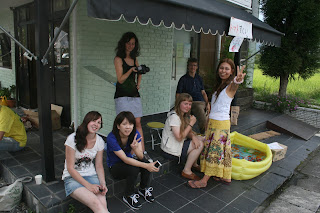No, he's not mowing the lawn, he's using an old, rusty rice-field-weeder. It has a wheel with spikes on it that churns up the weeds and deposits them into a tray. It may save you your back, but it will give you terrible blisters. Notice he's not using any gloves.

See, hands work just as well, and are maybe more fun. Squelching around in sticky mud brings out the kid in all of us. We spent many days hand-weeding Ozawa-san's rice field.
(in this photo, from left: Sylvia and Theresa, two Austrian wwoofers)
Ozawa-san has many fields, something like twelve in all, but not all of them are organic, because it's impractical for one person to maintain. Ozawa-san agreed to keep a number of them organic if we agreed to help with the upkeep. In May we planted from seed this huge field of black soybeans, which is Tamba-Sasayama's specialty crop. We're looking forward to the harvest in October.

In August we took a break from weeding to do our 2nd annual Ecotopia camp, where everyone spends a week camping out in the woods, giving workshops and learning how to work together and live a little bit differently. At least that's how it's supposed to happen, but this summer we were dealt a freakishly long rainy season, so EVERYTHING we've tried to outside has gotten rained out. So we just had the "camp" inside. We were split into two houses, so we didn't get to experience the same community vibe, but we still had a good time and learned a lot. Andy gave us a workshop on improvisation and rhythm and made a bunch of cool percussion instruments out of garbage. Gen and Yuuko worked on building a smokehouse to preserve all the wild boar and deer that we hunt. Ideas for a sweat lodge/sauna were tossed around, and Louis and Lawson made a forge and have since made a couple of knives.
(in this photo, from left: Mary Strandquist, Nicholas Broman and Andy Savoy)
We did get to spend one night in the forest. We lugged a bunch of supplies to the site, enough for 25 people to camp for three nights, only to lug it out again the next day when we were inundated by torrential rains. Bummer.



(Eco and Rocco, photo by Anne Marijn Koppen)
But worse than the rain was our goat Eco getting sick. This is a photo from when she was healthier. We noticed her acting more stubborn than normal and that her balance was a bit off, and then one morning she couldn't stand up. The vet came and told us she had filariosis, a potentially lethal infection from a parasitic nematode. They colonize in the spine and affect the nervous system, so her mobility became seriously impaired. We really thought we were going to lose her, and for four days we had to feed her by hand until she was strong enough to stand up on her own. Nearly a month after first showing symptoms, she's still weak and can't hold her head up, but she made it!
(in this photo: Momoko and Mary Strandquist)
During the Dekansho Festival, which attracts around 30,000 visitors to Sasayama to eat chicken on a stick, drink lots of beer and do something called the obon-dance on the grounds of Sasayama castle, we held our first flea market in the parking lot of LABO English School with the hopes of raising money for Nou-En. We invited donations from the school's students and gathered quite a lot of merchandise-- clothing, books and toys, as well as some of Ozawa-san's organic vegetables and local tomato jam and salsa from the landlord of the Nou-En house. Kinari Glass, the company a few meters down the road from the house, set up a booth to sell their beautiful glass beads.
(in this photo, from left: Theresa, Yuuko, Sylvia, Meredith Strandquist, Andy Savoy, and Yuka Fujii)
A mainstay of Japanese festivals is a game where, for a small fee, you try to catch goldfish or tiny turtles using paper net. We filled a baby pool with water and then dumped in a bunch of donated cherry tomatoes. Maybe it's not as exciting as catching a living thing, but the kids had fun. I think the record was something like 42 tomatoes. The kid had great technique-- he used the rim of the plastic net to flip the tomatoes into the bowl.
(in this photo: Yoshi, Hiro, Eddie, and Rocky)
We set up a stage on top of the sandbox to feature some local musicians. Yuichi, one of our students at LABO, did beatboxing, and Eddie sang r&b.
Our flea market managed to raise some money for the project and we've decided to continue it and make it a bi-monthly event. Our next one will be held on September 20th. Little by little we want to increase the number of vendors to create a thriving market featuring local products.
-posted by Anna






